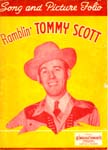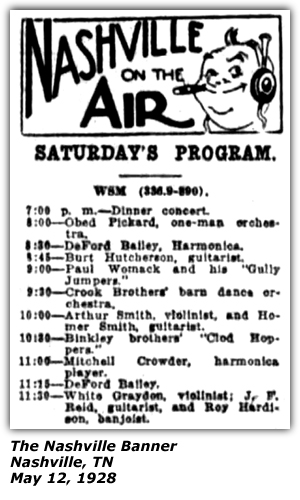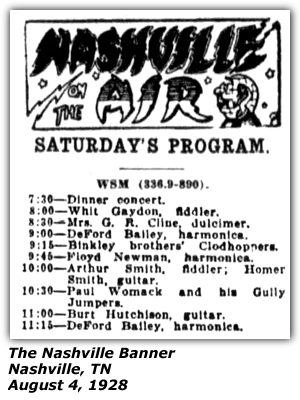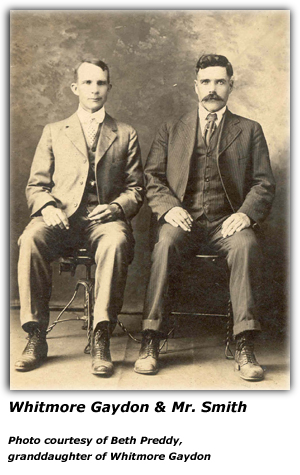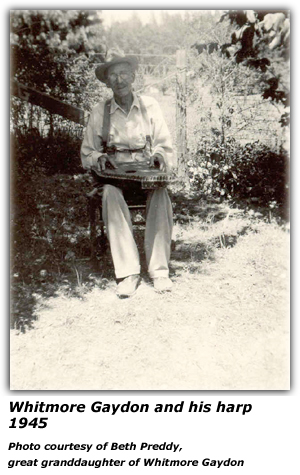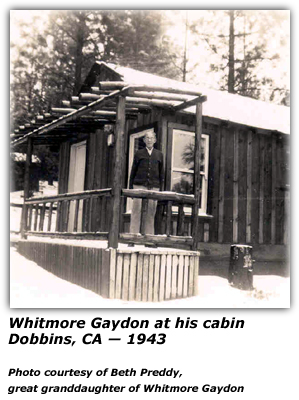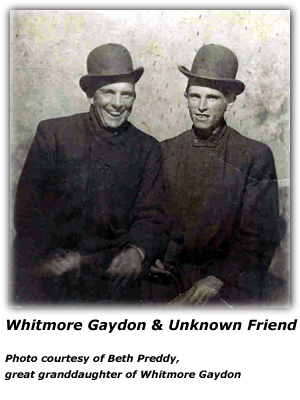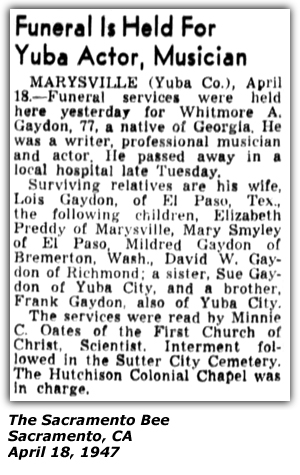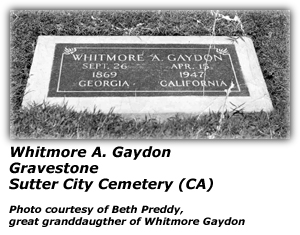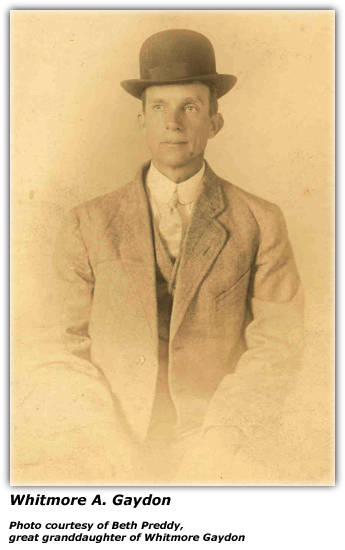 While researching the early history of the WSM Grand Ole Opry in the late 1920's, a name caught our eye.
A fiddler. But we knew nothing else. Charles K. Wolfe mentioned on that he was a "well-known trick and imitative fiddler" in Appendix A of his
book, "A Good Natured Riot." Once we figured out the correct spelling of his name, things began to fall in place.
He appeared on the several times over a few months in mid-1928 (May 12, 1928, May 26, 1928, June 9, 1928, June 23, 1928, July 7, 1928,
July 14, 1928, July 21, 1928, and, August 4, 1928. Research uncovered some interesting tidbits about Whitmore.
While researching the early history of the WSM Grand Ole Opry in the late 1920's, a name caught our eye.
A fiddler. But we knew nothing else. Charles K. Wolfe mentioned on that he was a "well-known trick and imitative fiddler" in Appendix A of his
book, "A Good Natured Riot." Once we figured out the correct spelling of his name, things began to fall in place.
He appeared on the several times over a few months in mid-1928 (May 12, 1928, May 26, 1928, June 9, 1928, June 23, 1928, July 7, 1928,
July 14, 1928, July 21, 1928, and, August 4, 1928. Research uncovered some interesting tidbits about Whitmore.
Whitmore Anderson Graydon was born in Auraria, Georgia which is just south of Dahlonega in 1869. His parents were
Jasper and Mary Graydon. Review of old census records indicate he was once a gold miner, then became a farmer. He died
in 1896. His mother, Mary, was also born in Auraria. She died in 1906. They married on April 20, 1852 in Lumpkin County, GA.
Following Whit as he became known was interesting to say the least as his name shows up in several places.
He married the former Lois Brooks Risinger on August 22, 1907 in Randolph, Bibb County, Alabama. A short blurb
about their marriage indicated that he was a 'traveling man from New London, NC and is an energetic man of sterling
qualities and wide experience.' After the ceremony, they took the train to Columbus, MS where they planned to reside a while.
Census records show his movements - Centerville (Bibb Co.), Alabama (1920); Marysville, California (1930) (with his brother);
Miami, FL (1940); Rural, California (Implied residence 1935 per 1940 census);
He also left a trail in newspaper archives. But he was not your typical musician.
Research shows he often wrote to various newspapers where he lived. On one occasion, he wrote a response
to the Selma newspaper editorial regarding the "greatest question of the ages, World Peace." But his praise of the editorial
turned into a comment on politics. Thought was given to just including a paragraph or two, but in the end, it was
felt the reader would rather enjoy reading what this "old fiddler" had to say. Here is that letter:
"Your editorial in the Times-Journal of September 14 (1928) in regard to that greatest question
of the ages — World Peace — should serve as a model for all the other great dailies to follow. The sentiments
expressed in those few lines are of the very highest that can be advanced until such time as true civilization shall
have a become a fact instead of a subject for idealists and dreamers.
To those of us who have caught the vision is coming that happy anticipation of a world governed by right rather
than by might.
It is only the willfully blind who fail to read the signs of the times. When the British premier, Ramsay McDonald,
arm-in-arm with Premier Herriot, of France, entered the hall in Geneva in which was being held the most far reaching and successful
sessionof the League of Nations, all present must have realized that the turning of the tide was at hand. The league has struggled
on through the dreary years. Europe, prostrate and bleeding, has at last staggered to her feet after crying in vain
for the aid and the leadershiop of her strong, big-hearted and magnanimous brother from across the seas. But the world is
beginning to understand that it has been duped. The fact is now looming large before the nations of the earth that the greate affable giant
of the new world does not stand for war, for hatred or for isolation. The fact that the league was defeated in this country by a band
of professional political cut-throats in the Senate instead of the American people is now clear to all thinking people
everywhere.
The defeat of the Treaty of Versailles in the United States Senate by the ophidian Lodge and his detestable henchmen, the LaFollettes,
the Johnsons and the Reeds, may not have broken the heart of the world but it broke one of the biggest hears that ever throbbed
in anguish for a stricken and war-torn world.
It is the firm conviction of this writer that Warren G. Harding was also killed by the same poison dagger that destroyed the immortal
Wilson. Though Harding's position was vastly different and his vision and personality not on so high a plain as that of Wilson,
his problem was none the less poignant. In some respects it may have been more so. For he doubtless realized he must remain
forever silent and impassive in the face of an overwhelming duty. Though he had never openly repudiated the league, he had accespted,
for political expediency, the aid of the perfidious poison squad who were responsible for its defeat.
Through the death of Harding, Calvin Coolidge has fallen heir to this problem. But Coolidge is of a different temperament. He doubtless
realized at the outsdet that his door of duty and opportunity was irrevocably sealed. Therefore being of a highly practical
and efficient mold he has turned his attention to government economy and other domestic questions of a highly beneficial
nature leaving the broader affairs of the world for his successors to handle. In case of his election this fall he will be embarrassed
throughout his term by the same sinister influences that killed his two immediate predecessors, and which would destroy him
also, he were to cast his heart into the issue as they did.
Then what must all true Americans do? The answer is obvious: Let all friends of humanity — all those who abhorr wars of
aggression — all who believe in American world leadership and true progress — all forward-looking men and women of this
country rally to the standard of John W. Davis. Handicapped as he is by a foolish, futile and Bryanish platform, nevertheless
he has shown many traits of true greatness in his rather guarded and cautious speeches. He has shown that he has much of Wilson's
great vision tempered y the sound, practical conservatism of Grover Cleveland. What a happy combination!
Given free rein, let us imagine what such a man could do for this world. And I believe we may rest assured that John W. Davis
can be depended upon to do for Bryan's stupic and ridiculous "referendum" just what Woodrow Wilson did for this same
Bryan's anti-second-term plank that he succeeededin tagging to the Baltimore platform: Knock it sky high.
Then shall be ushered in the day of peace, understanding and cooperation among the peoples of the earth hitherto undreamed
of by the Philosophers of the ages. With John W. Davis in the presidential chair, "Peace on Earth, Good Will
to Men" shall become a fact rather than a platitude.
No one claims that will create new heaven but none can say that we shall have a new earth."
Whitmore Anderson Gaydon
Selma, Ala.
Sept. 18, 1924
Selma Times-Journal
But Whit Graydon was also a 'world champion fiddler.' In June of 1926, he was trying to organize a fiddling contest
patterned after one that Henry Ford had held the previous winter. It was hoped Mr. Ford would attend. Whitmore Anderson
Gaydon then living in Miami, was spearheading the event. It was meant to last a weekend. Other contests were to be held
in addition to fiddling including musical organizations, chorus and singing societies. Other suggestions were offered
such as old-fashioned square dancing and candy pulling events. Other plans called for an 'oxe team parade' to start
the week of festivities. The oxe team would drag an old-time 'prairie schooner.' Another activity planned was
an old-fashioned torchlight pade in imitation of an election night of years ago to close the activities. It was said that
he had taken part in radio broadcasts from the Fleetwood Hotel radio station (WMBF) several times. Before he came to Miami,
it was reported he sold musical instruments.
He took it upon himself to write one newspaper editor and explain the difference between
the violin and the fiddle.
"Fiddle and Violin"
To the Editor of the Age-Herald:
I read with much interest an editorial in a recent issue of your paper concerning
the "Fiddle and the Violin." In this article I think you do the fiddlers an
unintended injustice. As there is probably no fiddler who has won more prizes
than I have, and no man living who has fiddled around more firesides. I am
taking the chance of winning the contempt of my fellow fiddlers by this attempt
to present our case from the standpoint of the fiddler. The true fiddler has
the same contempt for the man who tries to explain fiddling to those who cannot understand
it that a humorist would have for his fellow craftsmen who tried to explain his jokes to
those who have no sense of humor. "Casting pearls before swine," as they call it.
Those who fail to comprehend anything more than the "shuffling of the foot
and the scraping of the bow," are to be pitied. Those who have failed to detect
that melancholy note have never had their emotions stirred to their depths. The difference
between the fiddle and the violin as we see it, is the same as suggested in the
old debating society question: "Resolved: That the work of nature is superior to the
art of man." If music is the water of life, the violinist presents his in cut glass
on a silver tray, while that of the fiddler comes as the roaring cataract,
the bubbling spring, the ocean wave and the dashing rainstorm."
Whitmore Gaydon
Selma, Ala.
June 2, 1923
He was to be the master of ceremonies at the Fiddlers' Convention
that was being held at the City Auditorium in Dothan, AL on Friday night, October 14, 1927. While one purpose of the
event was to entertain the audiences, the other purpose was to raise funds for the benefit of the Dothan
City Schools physical education program. The expectation was that some of the best fiddlers in southeast Alabama
would be a part of the program. First prize would earn $10 and second prize would get $5. About 25 or 30 contestants
were expected to show up and take part in the contest.
Another Fiddler's Convention was to be held on November 4th in Elba, AL at the school auditorium. Whit Graydon
was to be in charge of the event and would play a few selections, but would not take part in the competition.
Similar to the earlier event, cash prizes would be awarded for first and second place. The Civic Improvement
Club was sponsoring the event and an admission price of 15 cents and 25 cents would be charged.
By 1928, his talents and fame must have gotten the attention of WSM. He first appeared on the "barn dance", as
it was often referred to in those years before the Opry name caught on, on Saturday night May 12, 1928.
The folks at WSM even wrote a letter to the town where he used to live in Alabama touting his appearance.
Nashville, Tenn.
Dear Editor:
Whit A. Gaydon, a former resident of your County is broadcasting from station — W.S.M. — every Saturday
night. He once won the fiddling championship of Alabama, and is composer of the "Fox Chase" and of the "White Lily."
The latter being named for his novel, "The White Lily Of The Gates Of Glohun."
Respectfully,
W. L. Clancy, (W.S.M.)
One wonders if he offered any of his thoughts or opinions during his spots on the Opry in 1928.
In 1929, he wrote another lengthy letter to the editor of the Commercial Appeal in Memphis, TN. He offered up his
opinion / thoughts on two articles the paper had recently published, prayer wheels and being left-handed. He signed
his letter, "The Rambling Fiddler" and seems to indicate he wrote it from Malvern, Arkansas.
He wrote to the Memphis paper again in 1929 from Monroe, Louisiana to comment on another letter writer who thought
that city people were lacking in culture. Here is a paragraph from that essay from the "The Old-Time Fiddler:
"In 30 years of rambling I have made a study of this condition and have formed a definite opinion as to its cause.
I believe the city dweller is not fundamentaly different from his or her neighbors in the small towns. Einvirnment is the
sole trouble. City people generally become over-awed by the man-made magnificance by which they are surrounded. They become
heckled and cowed. They become obsessed with an inferiority complex. ...
Small towns are where the good folks dwell. Here you find culture in its purest form. Here awaits the sincere hospitality
to the stranger. Here high talent receives its reward and appreciation. If you want ot raise your children to become
men and women of culture; if you want them to become red blodded, self-reliant, broad minded, healthy, happy citizens, keep
them in the smaller towns. The crude, rude city dwellers should not be censured for their hopeless plight. They are to be
pitied."
In 1936, his daughter (Mildred Gaydon, then 25) was exonerated by a coroner's jury in the death of the Count of Covadonga, an heir to the throne
of Spain and son of ex-King Alfonso, who was a passenger in her car that struck a light pole.
Whitmore A. Gaydon Family Details
- Whitmore Anderson Gaydon
(B: September 26, 1869 (Auraria, GA) — D: April 15, 1947)
- Lois Brooks (Risinger) Gaydon
(B: November 28, 1890 (Randolph County, AL) — D: August 11, 1964)
- Brooks Elizabeth (Gaydon) Preddy
(B: January 8, 1909 (Alabama)— D: September 24, 1994)
- David Welch Gaydon
(B: August 23, 1910 (Wetumpka, AL) — D: September 17, 1984)
- Mildred (Gaydon) Decardy
(B: July 29, 1913 — D: April 16, 2003)
- Mary Angelene (Gaydon) Smyley
(B: April 4, 1917 (Centerville, AL) — D: August 15, 1948)
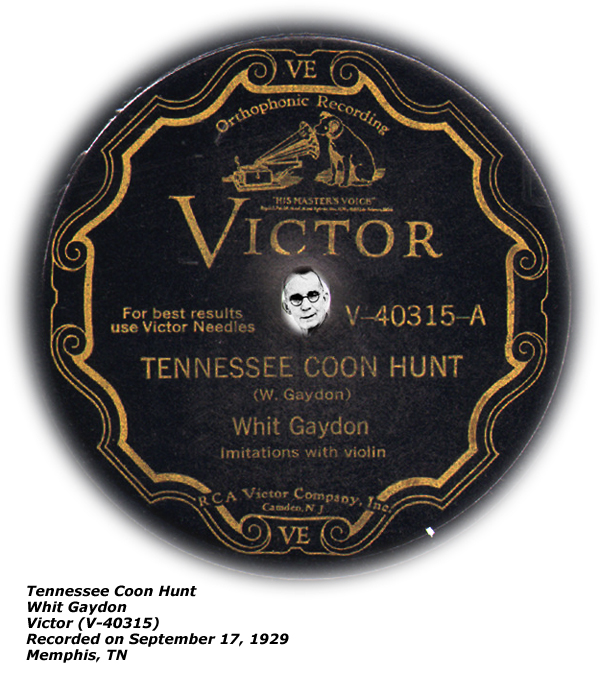
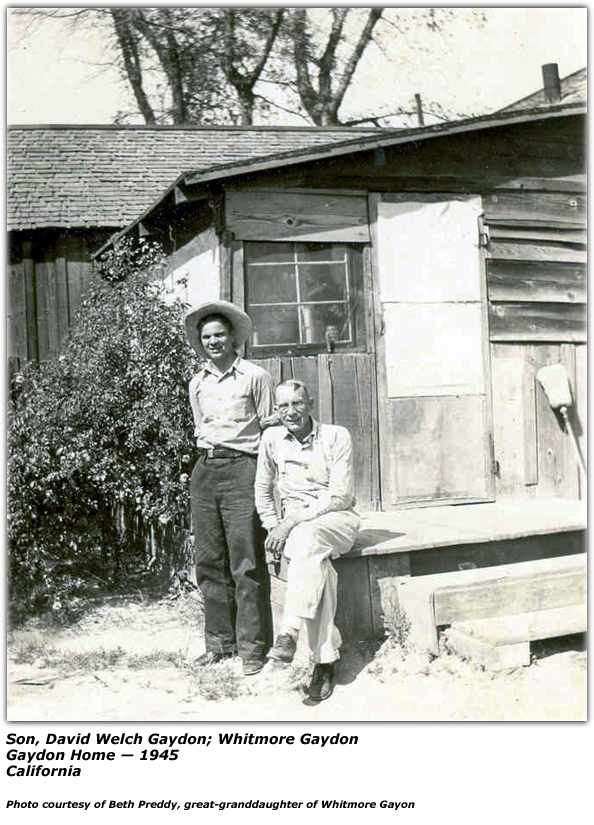
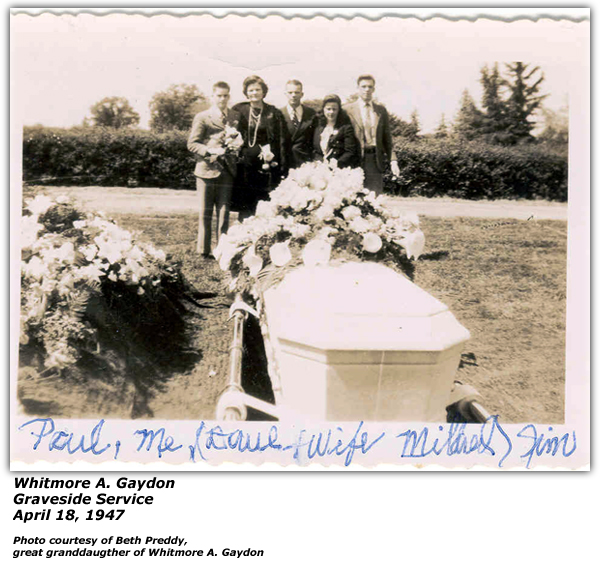
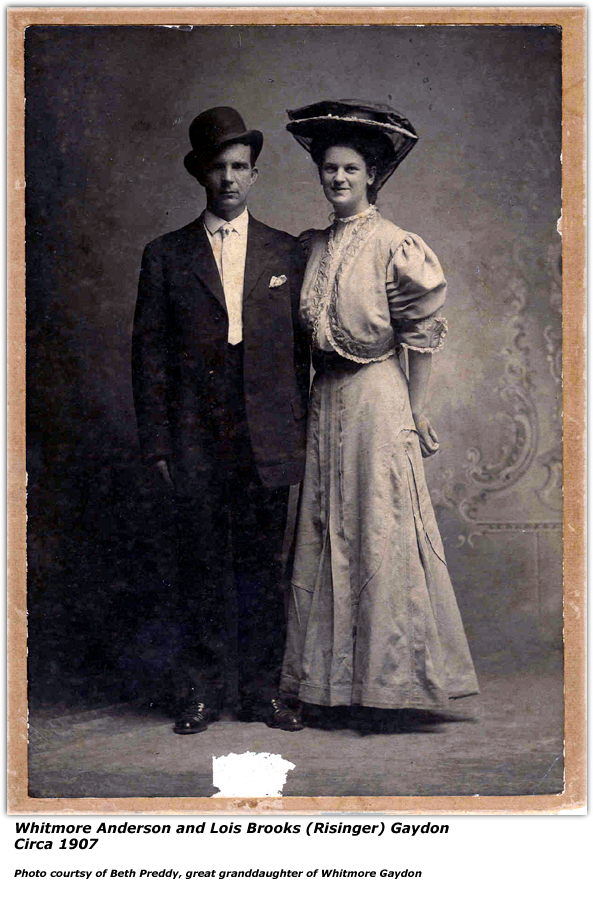
Credits & Sources
- Hillbilly-Music.com would like to express its appreciation to Beth Preddy, great granddaughter of Whitmore Gaydon for
providing photos and notes from family history for Whitmore's biography.
- Editorial On Peace Approved; Whitmore Anderson Graydon; September 21, 1924; The Selma Times-Journal; Selma, AL
- Fiddlers Invited To Dothan Oct. 14; October 13, 1927; Abbeville Herald; Abbeviolle, AL
- Fiddler's Convention at Auditorium On Nov. 4th.; October 27, 1927; The Elba Clipper; Elba, AL
- Letter to the Editor; W. L. Clancy, WSM; May 31, 1928; The Centreville Press; Centreville, AL
- Ford Invited To Miami 'Fiddling'; June 23, 1926; The Miami Tribune; Miami, FL
- Letters to the Editor - Turn To The Left; Whit Gaydon, The Rambling Fiddler; April 1, 1929; The Commerical Appeal; Memphis, TN
- Letters to the Editor - Where Good Folks Are Found; Whit Gaydon, The Old-Time Fiddler; May 2, 1929; The Commerical Appeal; Memphis, TN
- I Reckon So; T. H. Alexander; September 18, 1929; The Knoxville Journal; Knoxville, TN
- Girl Is Freed Of Blame In Royal Death; September 9, 1936; The Appeal-Democrat; Marysville, CA
- Ex-Tar Heel; September 14, 1936; The News and Observer, Raleigh, NC
- Whitlings; December 6, 1937; The Appeal-Democrat; Marysville, CA
- W. A. Gaydon Weds; September 12, 1907; The Enterprise; Albermarle, NC
Sound Sample—(YouTube Video Format)
|

